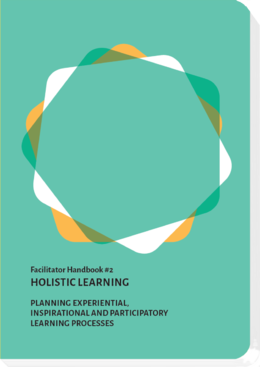The following checklist will help you to analyze your plan focusing on the human needs of participants and facilitators.
 E. Skowron
E. Skowron
Related:
Also interesting:
Our Handbooks

E. Heublein, N. Zimmermann
Holistic Learning
Second Handbook for Facilitators: Read more
1.Social level
- Do the participants have enough time to get to know each other?
- Which methods will support them in overcoming uncertainty?
- Is there enough time and space to socialize in the evening?
- Are the methods diverse enough to find new combinations of participants over and over again?
|
2. Physical level
- Do the starting and ending hours and breaks of the seminar allow for participants (and facilitators) to go for a walk, a jog, etc.?
- Are energizers planned, are they enjoyable for everyone?
- Do the methods “force” participants to “get up” from their chairs from time to time?
- Does the food provided in the seminar give participants and trainers enough energy for work?
- Is the seminar room a welcoming and inviting space to work?
|
3.Intellectual level
- Are discussion or exchange sessions planned?
- Do the starting and ending hours of the seminar enable participants to organize an extra session before or after seminar hours?
- Is there a seminar library/ resource recommendations for the topic?
- Is there a designated time for questions that crop up during the seminar/session and a space for tackling them?
|
4.Emotional level
- Is there time for participants to arrive emotionally to the seminar?
- Is individual work/ working in pairs or small groups planned?
- Is there enough individual space before and after the sessions?
- Are there methods/approaches that strengthen trust in the group and foster an open attitude on the part of facilitators and participants alike?
|
5. Spiritual level
- Do the starting and ending hours of the seminar enable participants (and facilitators) to organize a special session (e.g. meditating, yoga, etc.) before or after seminar hours if they want to?
- Does the schedule of the seminar conflict with participants or facilitators’ religious needs (praying, visiting a place of worship)?
- Do the chosen methods and working culture reflect particular values that might not be shared by all participants?
|
The checklist can be extended according to the nature of the event and can also be reflected upon during the seminar. This reflection should have an influence on the ongoing program, e.g. giving more attention and time to the emotional level of the seminar based on the group dynamics.




